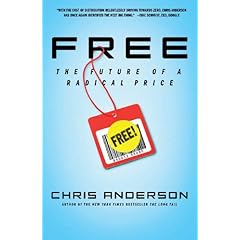“And as ye go, preach, saying, ‘The kingdom of heaven is at hand.’ Heal the sick, cleanse the lepers, raise the dead, cast out devils: freely ye have received, freely give.”
—Matthew 10:7-8 (KJV)
Recently, a few gripes have been circulating across the Web from plugin developers for WordPress. As an open source product, WordPress itself costs nothing. As hardcore GPL supporters, the company behind WordPress has even displayed a bit of ire that some designers of themes have insinuated links to pay sites in their free offerings. This made some theme developers livid because it threatened their revenue stream.
But the plugin developers’ complaints are new. They say that their free plugins, which often have notes added requesting donations (which I’m fine with, as the plugins are a lot of coding work), don’t even receive thank yous from users, only complaints.
Welcome to the world of free.
Recently, Chris Anderson of Wired Magazine, whose pontificating about “the long tail” captured the fancy of business leaders everywhere, released his latest book, Free: The Future of a Radical Price.  It expands on an article he wrote in 2008, “Free! How $0.00 Is the Future of Business.”
It expands on an article he wrote in 2008, “Free! How $0.00 Is the Future of Business.”
Anderson argues that unless a business is giving away important products for free, it’s doomed. The way companies will have to make money from free is by offering some kind of “freemium” deal, giving away part but offering a paid whole so attractive that people will want to buy it in addition to what they are receiving freely. On some level, that makes sense.
As someone who takes advantage of free, I love it that good things are available without cost. My computers bulge with open source software, some of it outstanding. The time clock I use to track the work I do as a writer is a free Adobe Air application. And if I wanted to, I could dump Microsoft Office and go with Open Office. So free is good.
But I’m not a freemium buyer. If I have to pay, I tend to do without or find a source that offers similar functionality that is still free.
And this is a problem, because that inability to convert free users to freemium buyers is destroying some businesses. Google has managed to figure out how to do this, but few others have. The newspaper industry is a classic example of “death by free.” Free online news and free classifieds through Craigslist have gutted their business model. The New York Times tried to cajole readers into paying for access to online op-ed pages, but with everyone in the world having an opinion, no one bit. Only The Wall Street Journal has had any success with free and freemium, and even they’re losing money.
What’s bad about this is that free is a genie that won’t easily go back into its bottle. Too many people expect to get something for nothing now. And many of them are like me: “No thanks on the upsell.”
When I ponder free and freemium, I consider how they will affect the Church, especially in the West.
Last year, the Church of England lost £400 million due to investment wipeouts in the world’s economic turmoil. They had to seriously curtail spending as a result. Other denominations face similar shortfalls.
Attending church, on one level, is technically a free activity once the cost of driving to a church meeting is excluded. But then again, it’s not. Some churches demand a tithe. Others don’t, but they still rely on the generosity of attendees to fuel pastoral salaries and the increasing costs of educational materials and programs. And lately, has anyone checked the church utility bill? Yowza!
But with more and more people believing in the gospel of free, where does this leave the Church?
For 13 years, I was part of a megachurch noted for its drawing the unchurched or those dissatisfied with prior church experiences. Throughout the history of that church, a low expectation existed concerning asking people in the seats for their money. As a result, that church, despite many thousands attending, faced nonstop cashflow issues. Too many people showed up, partook of all the costly services the church offered, and gave $0.00 in return. In the end, that church had to radically alter its perspective on asking the people for money, and even instituted a membership program (freemium?) where none had existed before.
I believe what I saw at that church was the cusp of the problem the Church in America overall will encounter with this idea of free.
And so I wonder…
In what ways are the thought processes of church attendees being affected by this notion of free?
How will free alter the way the American Church operates?
Is there a freemum option open for churches?
How will companies that serve the American Church adapt to free? Will they go the route of newspapers?
Will free ultimately make American Christians more stingy or less?
I look at the Book of Acts and I see a model of free that is totally at odds with the way we American Christians live. Nothing we do in the Church here is free. If free genuinely catches on and the business world manages to make it work, I think the Church faces some radical problems it has not bothered to prepare for.
In the wake of lost investment monies, Westernized churches around the globe are reporting budget shortfalls and subsequent program cancellations or staff reductions. Church buildings, staff salaries, and programs ain’t cheap. A world built on a cost of $0.00 poses enormous challenges to Western churches grown used to watching stacks of money pour in from the faithful.
Honestly, I think a world of change is needed—and quickly. What do you think?

 the cost of learning to find common ground with people they would not have chosen to be in their Christian clique.
the cost of learning to find common ground with people they would not have chosen to be in their Christian clique. On Monday, I wrote concerning
On Monday, I wrote concerning